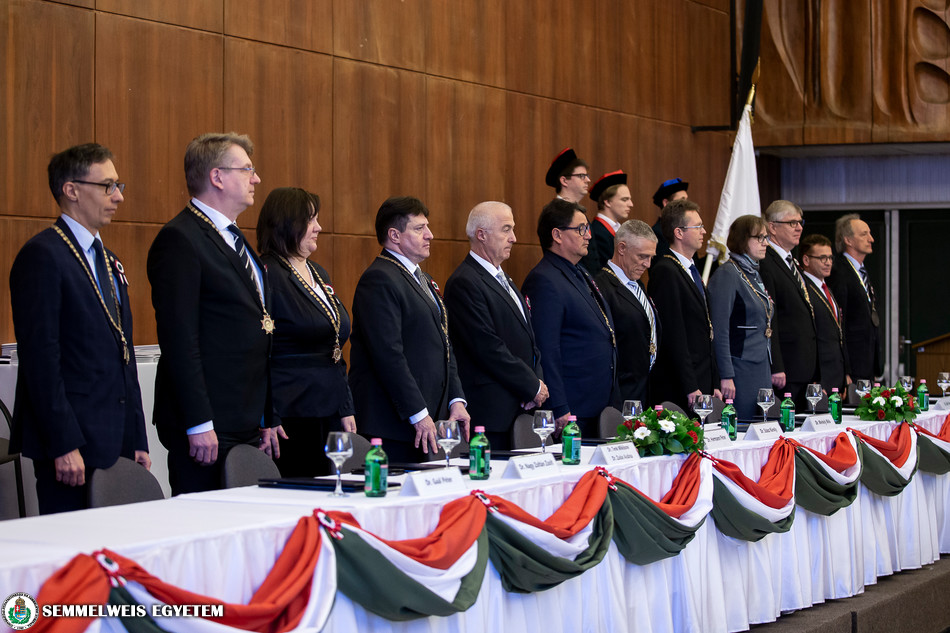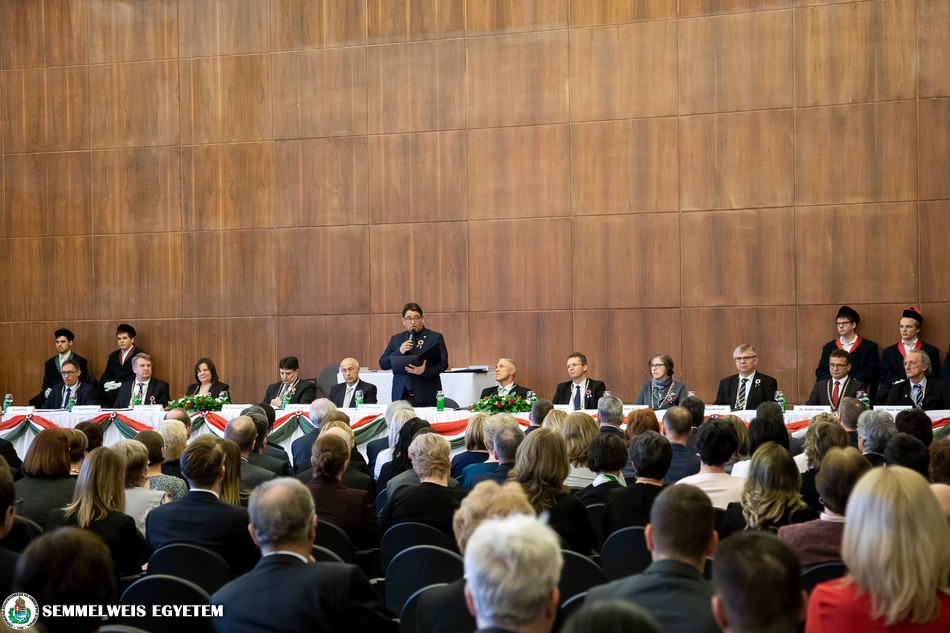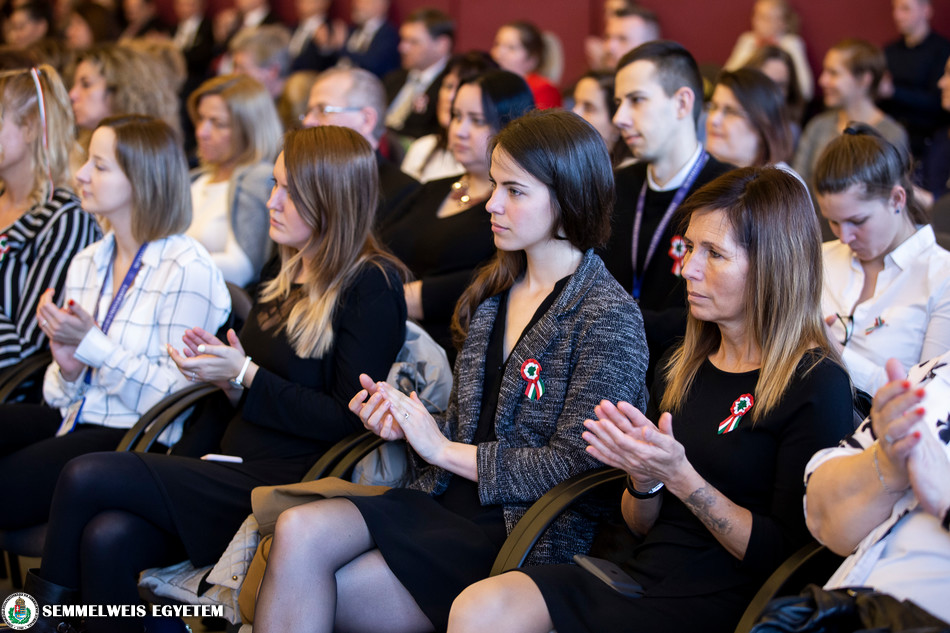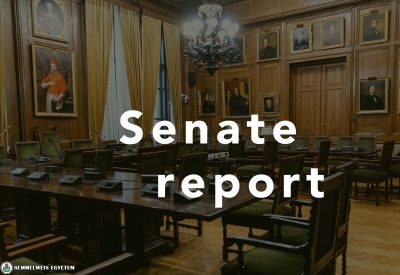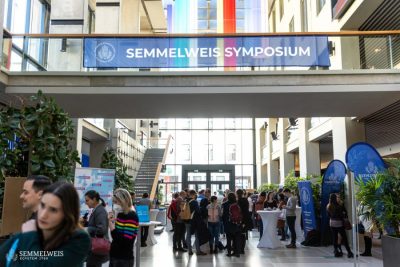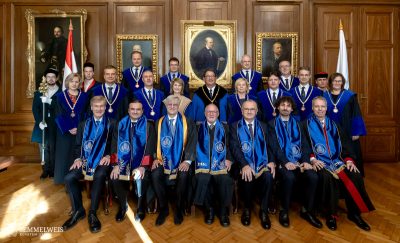We should draw inspiration from the heroes of 1848 when defining what kind of university we want to build over the next quarter millennium, said rector Dr. Béla Merkely in his opening remarks at the event commemorating the 171st anniversary of the 1848–1849 Hungarian Revolution and Freedom Fight. A commemorative speech was held at the event by Dr. Nándor Ács, director of the Department of Obstetrics and Gynecology, after which around 150 university workers and students were awarded special recognitions.
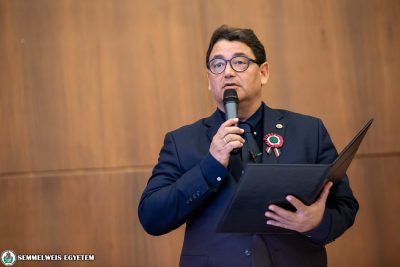 “Respect the past to understand the present and to work for the future” – these words from Count István Széchenyi were quoted by rector Dr. Béla Merkely to open the commemoration event held on the 171st anniversary of the 1848–1849 Hungarian Revolution and Freedom Fight. He said that the 1848 revolution plays a significant role in the history of Semmelweis University, which celebrates the 250th anniversary of its establishment this year, since when we think back to this period, we also remember those ancestors who played an active role in the revolution while also carrying out a revolution in their own profession of medicine. He noted as examples János Balassa, Lajos Markusovszky and Sándor Lumniczer, who in addition to partaking in the events of the revolution were all members of the progressive group of physicians centered around Balassa, which developed plans to elevate physician training, public health and medical sciences in Hungary. Respect to the heroes of 1848, from whom we have to draw inspiration when defining what kind of university we want to build over the next quarter millennium, noted Dr. Béla Merkely. Quoting Lajos Markusovszky (“… Merge theory with practice, as it is in life, and visit hospitals as soon as possible, if you are preparing to become a doctor; do everything around the patient that doctors need to know and understand…”), the rector spoke about the significance of practical training and that a curriculum reform with the involvement of all Hungarian medical universities is currently underway. He emphasized that he wants to build a university that by 2030, in the honor of the Hungarian nation and its ancestors, will be among the top 100 universities in the world, and among the five best medical and health sciences universities in Europe. “We are building a university that is training Europe’s best doctors and health care professionals for the Hungarian nation and that serves innovation in health care and pharmaceuticals, which are of national strategic importance; and whose foreign-language programs, and the commitment to our nation of those studying here, strengthens further,” the rector declared.
“Respect the past to understand the present and to work for the future” – these words from Count István Széchenyi were quoted by rector Dr. Béla Merkely to open the commemoration event held on the 171st anniversary of the 1848–1849 Hungarian Revolution and Freedom Fight. He said that the 1848 revolution plays a significant role in the history of Semmelweis University, which celebrates the 250th anniversary of its establishment this year, since when we think back to this period, we also remember those ancestors who played an active role in the revolution while also carrying out a revolution in their own profession of medicine. He noted as examples János Balassa, Lajos Markusovszky and Sándor Lumniczer, who in addition to partaking in the events of the revolution were all members of the progressive group of physicians centered around Balassa, which developed plans to elevate physician training, public health and medical sciences in Hungary. Respect to the heroes of 1848, from whom we have to draw inspiration when defining what kind of university we want to build over the next quarter millennium, noted Dr. Béla Merkely. Quoting Lajos Markusovszky (“… Merge theory with practice, as it is in life, and visit hospitals as soon as possible, if you are preparing to become a doctor; do everything around the patient that doctors need to know and understand…”), the rector spoke about the significance of practical training and that a curriculum reform with the involvement of all Hungarian medical universities is currently underway. He emphasized that he wants to build a university that by 2030, in the honor of the Hungarian nation and its ancestors, will be among the top 100 universities in the world, and among the five best medical and health sciences universities in Europe. “We are building a university that is training Europe’s best doctors and health care professionals for the Hungarian nation and that serves innovation in health care and pharmaceuticals, which are of national strategic importance; and whose foreign-language programs, and the commitment to our nation of those studying here, strengthens further,” the rector declared.
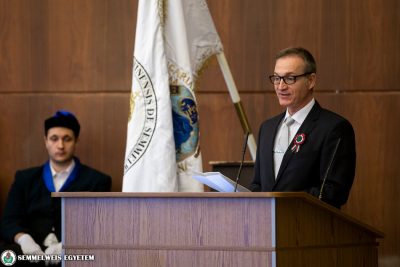 This year, the commemorative speech was held by Dr. Nándor Ács, director of the Department of Obstetrics and Gynecology, who said that March 15 was always his favorite national celebration, whose message is easily understood by everyone: it means the need for Hungarian national solidarity, the fight against oppression and the creation of an independent Hungarian state. The memory of the 1848 Revolution and Freedom Fight is heroic, bursting with strength, and uplifting, but at the same time, looking back from a distance of more than 170 years, it is also heartbreaking and sad, he stated. He noted that freedom was created by individuals who were able to create, and also willing and able to work in the interest of common goals; the opportunity for the democratic revolution was made possible by the people acting together. Their will was forged and their strength multiplied by knowing that they are capable of great things if they act together. Dr. Nándor Ács also recalled the integrity and courage of the university’s legal predecessor, the Medical Faculty of the Royal University of Hungary in Pest, during the events of the revolution, and pointed out that the academic staff decided in the spring of 1848 that its main role should be the training of medics; that was when the structure of education took the form that it is still based on today. “It is a notable similarity that after long decades without change, now is the time that the faculty of medicine has reached the point where we are planning a comprehensive reform of the curriculum that reflects the practices of today,” he noted. He stressed that this reform as well has to be carried out very quickly and efficiently, so that the university can be guided into the international forefront in education, research and healing.
This year, the commemorative speech was held by Dr. Nándor Ács, director of the Department of Obstetrics and Gynecology, who said that March 15 was always his favorite national celebration, whose message is easily understood by everyone: it means the need for Hungarian national solidarity, the fight against oppression and the creation of an independent Hungarian state. The memory of the 1848 Revolution and Freedom Fight is heroic, bursting with strength, and uplifting, but at the same time, looking back from a distance of more than 170 years, it is also heartbreaking and sad, he stated. He noted that freedom was created by individuals who were able to create, and also willing and able to work in the interest of common goals; the opportunity for the democratic revolution was made possible by the people acting together. Their will was forged and their strength multiplied by knowing that they are capable of great things if they act together. Dr. Nándor Ács also recalled the integrity and courage of the university’s legal predecessor, the Medical Faculty of the Royal University of Hungary in Pest, during the events of the revolution, and pointed out that the academic staff decided in the spring of 1848 that its main role should be the training of medics; that was when the structure of education took the form that it is still based on today. “It is a notable similarity that after long decades without change, now is the time that the faculty of medicine has reached the point where we are planning a comprehensive reform of the curriculum that reflects the practices of today,” he noted. He stressed that this reform as well has to be carried out very quickly and efficiently, so that the university can be guided into the international forefront in education, research and healing.
As part of the event, Dr. Béla Merkely presented Pro Universitate Awards to Mrs. Géza Fézler (Department of Obstetrics and Gynecology), Dr. Klára Szalai (Department of Dermatology, Venerology and Dermatooncology) and Dr. Ágnes Szigeti (Department of Dermatology, Venerology and Dermatooncology). Chancellor Dr. Károly Szász handed out a Pro Universitate Award to Albert Iklódi (Directorate of Kútvölgyi Clinical Center). Next, the rector presented the recognitions for outstanding workers, the commendations by the rector and the distinctions for outstanding conductors, which was followed by the presentations of commendations and recognitions of outstanding workers by the chancellor. Overall, around 95 workers of the university received recognitions from Dr. Béla Merkely and Dr. Károly Szász.
Awardees received their commendations by the deans from Dr. László Hunyady, dean of the Faculty of Medicine, Dr. Romána Zelkó, dean of the Faculty of Pharmaceutical Sciences, Dr. Gábor Gerber, dean of the Faculty of Dentistry, Dr. Zoltán Zsolt Nagy, dean of the Faculty of Health Sciences, and Dr. Miklósné Tenk Dr. Andrea Zsebe, dean of the András Pető Faculty. The Good Student–Good Athlete awards were also handed out at the event, as were awards by the Mihálkovics Foundation and the youth awards of the Association of Friends of Semmelweis University.
In his closing remarks, Dr. Béla Merkely congratulated all of the university citizens who received honors. “I wish for us to work together with a clear heart and in good health on building the next quarter millennium of Semmelweis University,” he said.
The full list of the nearly 150 university workers and students who received recognitions can be found in the article on our Hungarian website. For the full gallery of the event, also see our original Hungarian article here.
Translation: Tamás Deme
Photo: Dénes Erdős

